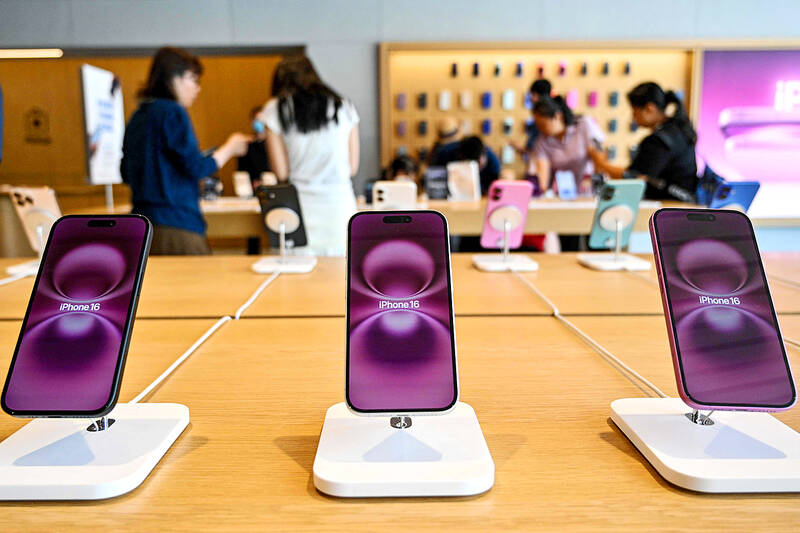It is possible for Apple Inc to move iPhone production to America, but it would almost double the cost of making the device while creating logistical headaches, according to Bank of America (BofA).
“iPhone cost can increase 25 percent purely on higher labor cost in the US,” BofA analysts led by Wamsi Mohan wrote in a note to clients on Wednesday.
While the tech giant can find domestic labor for assembly, a “significant portion” of parts used in manufacturing the iPhone would still be assembled in China and imported to the US, they added. Assuming Apple has to pay reciprocal tariffs on those imports, its total cost would rise 90 percent or more, they estimated.

Photo: Hector Retamal, AFP
The estimate comes as US President Donald Trump zeros in on China for his trade fight. The Trump administration paused its reciprocal tariffs on dozens of countries for 90 days, but increased its duties on China to 125 percent. Meanwhile, China slapped 84 percent retaliatory levies on American goods.
Fear of price increases spurred iPhone panic buying last weekend, while Apple chartered cargo flights to ferry 600 tonnes of iPhones, or as many as 1.5 million, to the US from India, in an effort to beat Trump’s tariffs, sources told Reuters.
For Apple to make relocating its final assembly of iPhones to the US viable, it would need tariff waivers on components and sub-assemblies manufactured outside of the country, Mohan wrote. However, he doesn’t see this happening.
“Unless it becomes clear as to how permanent the new tariffs are, we do not expect Apple to take the step of moving manufacturing into the US,” Mohan said. “We do expect, however, that Apple will continue to diversify its supply chain, and also increase production of iPhones in other countries such as India.”
As Apple diversifies its manufacturing beyond China, it has positioned India for a critical role. Taiwan’s Foxconn Technology Group (富士康) and India’s Tata Electronics Pvt Ltd, its two main suppliers there, have three factories in all, with two more being built, Reuters reported.

South Korea’s equity benchmark yesterday crossed a new milestone just a month after surpassing the once-unthinkable 5,000 mark as surging global memory demand powers the country’s biggest chipmakers. The KOSPI advanced as much as 2.6 percent to a record 6,123, with Samsung Electronics Co and SK Hynix Inc each gaining more than 2 percent. With the benchmark now up 45 percent this year, South Korea’s stock market capitalization has also moved past France’s, following last month’s overtaking of Germany’s. Long overlooked by foreign funds, despite being undervalued, South Korean stocks have now emerged as clear winners in the global market. The so-called “artificial intelligence

NEW IDENTITY: Known for its software, India has expanded into hardware, with its semiconductor industry growing from US$38bn in 2023 to US$45bn to US$50bn India on Saturday inaugurated its first semiconductor assembly and test facility, a milestone in the government’s push to reduce dependence on foreign chipmakers and stake a claim in a sector dominated by China. Indian Prime Minister Narendra Modi opened US firm Micron Technology Inc’s semiconductor assembly, test and packaging unit in his home state of Gujarat, hailing the “dawn of a new era” for India’s technology ambitions. “When young Indians look back in the future, they will see this decade as the turning point in our tech future,” Modi told the event, which was broadcast on his YouTube channel. The plant would convert

‘SEISMIC SHIFT’: The researcher forecast there would be about 1.1 billion mobile shipments this year, down from 1.26 billion the prior year and erasing years of gains The global smartphone market is expected to contract 12.9 percent this year due to the unprecedented memorychip shortage, marking “a crisis like no other,” researcher International Data Corp (IDC) said. The new forecast, a dramatic revision down from earlier estimates, gives the latest accounting of the ongoing memory crunch that is affecting every corner of the electronics industry. The demand for advanced memory to power artificial intelligence (AI) tasks has drained global supply until well into next year and jeopardizes the business model of many smartphone makers. IDC forecast about 1.1 billion mobile shipments this year, down from 1.26 billion the prior

People stand in a Pokemon store in Tokyo on Thursday. One of the world highest-grossing franchises is celebrated its 30th anniversary yesterday.